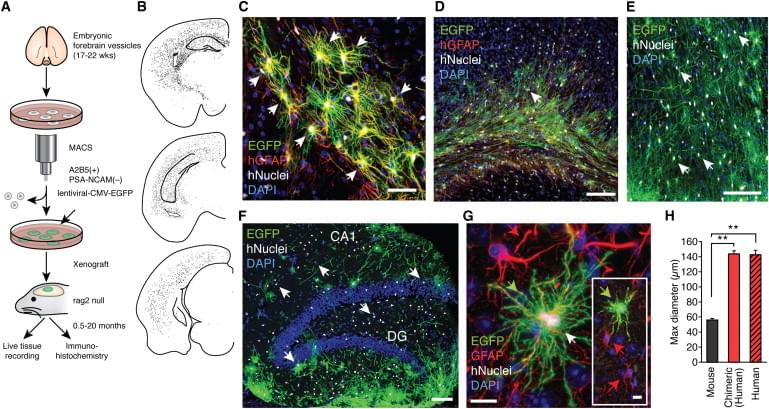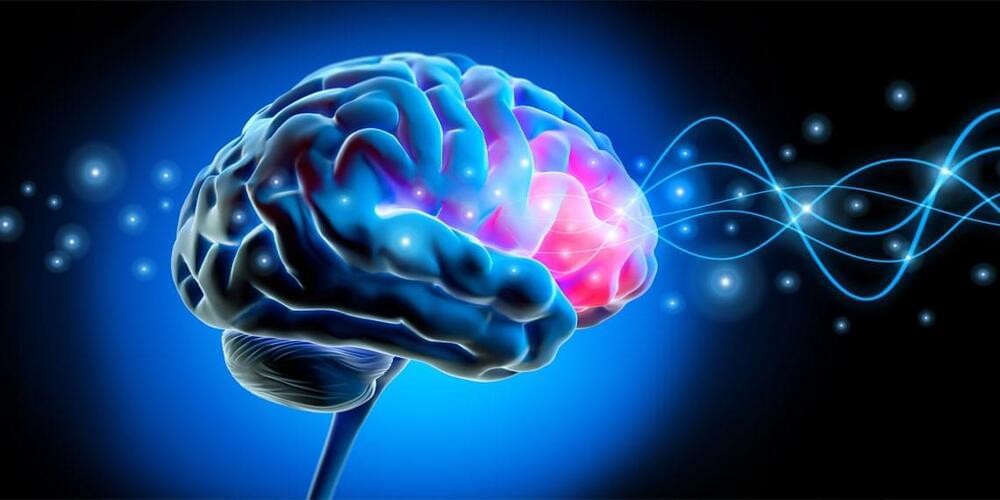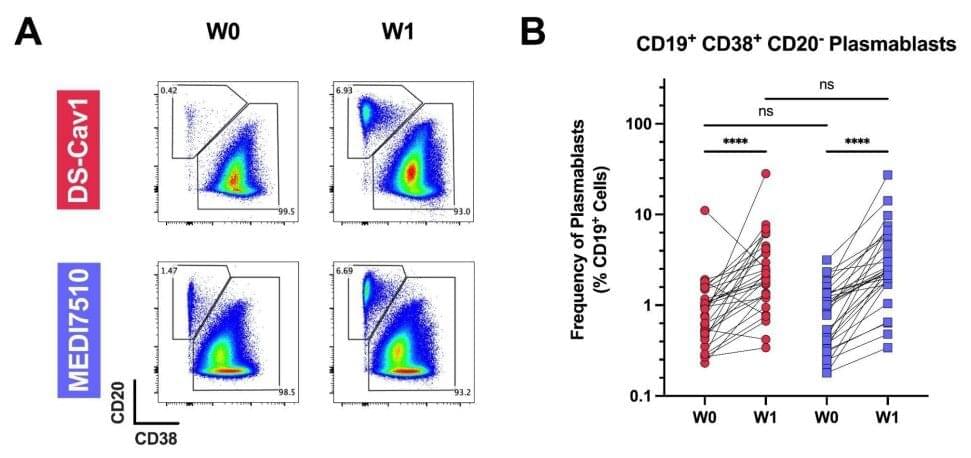Page 3513
Feb 2, 2023
Longevity gene may help rejuvenate the heart by 10 years
Posted by Kelvin Dafiaghor in category: life extension
Research in mice suggests that a gene associated with longevity in humans could help rejuvenate the aging heart and improve cardiovascular health.
Human astrocytes are larger and more complex than those of infraprimate mammals, suggesting that their role in neural processing has expanded with evolution. To assess the cell-autonomous and species-selective properties of human glia, we engrafted human glial progenitor cells (GPCs) into neonatal immunodeficient mice. Upon maturation, the recipient brains exhibited large numbers and high proportions of both human glial progenitors and astrocytes. The engrafted human glia were gap-junction-coupled to host astroglia, yet retained the size and pleomorphism of hominid astroglia, and propagated Ca2+ signals 3-fold faster than their hosts. Long-term potentiation (LTP) was sharply enhanced in the human glial chimeric mice, as was their learning, as assessed by Barnes maze navigation, object-location memory, and both contextual and tone fear conditioning. Mice allografted with murine GPCs showed no enhancement of either LTP or learning. These findings indicate that human glia differentially enhance both activity-dependent plasticity and learning in mice.
Video Camera
Feb 2, 2023
For those who missed the green comet, here are breathtaking videos, images of the rare astronomical sight
Posted by Shubham Ghosh Roy in categories: internet, space
The internet is abuzz with mentions of Comet C/2022 E3 (ZTF) a.k.a., the green comet, which on Wednesday could be seen with the naked eye.
As per NASA, the comet paid our planet a visit after a good 50,000 years. It was a rare feast for stargazers and astronomers alike as people around the globe witnessed the astronomical event.
Feb 2, 2023
In 50 years we’ll have ‘robot angels’ assisting us and will be able to merge our brains with AI, according to technology experts
Posted by Shubham Ghosh Roy in category: robotics/AI
Function receiveMessage(event) { console.log(event.data.fullscreen); Android.fullscreen(event.data.fullscreen); } window.addEventListener(“message”, receiveMessage.
Feb 2, 2023
Does Artificial Intelligence Impact Decision Making?
Posted by Shubham Ghosh Roy in categories: biotech/medical, robotics/AI

This post is also available in:  עברית (Hebrew)
עברית (Hebrew)
Have you ever used Alexa to help you decide what movie you should watch? Maybe you asked Siri for restaurant recommendations. Artificial intelligence and virtual assistants are constantly being refined, and may soon be making appointments for you, offering medical advice, or trying to sell you a bottle of wine.
Continue reading “Does Artificial Intelligence Impact Decision Making?” »
Feb 2, 2023
Buzzing the brain with electricity can boost the willingness to engage in mental effort
Posted by Saúl Morales Rodriguéz in category: neuroscience
Neuroscientists have successfully increased the motivation to exert mental effort by using a weak alternating electrical current sent through electrodes attached to the scalp to synchronize brain waves. The findings, published in Cognitive, Affective, & Behavioral Neuroscience, help to identify the neural mechanisms underlying the willingness to engage in mental effort, suggesting that midfrontal theta oscillations play a key role.
“For a long time research has mainly focussed on which brain mechanisms underlie mental processes, but in the recent years it has become clear that engaging in mental activities needs to be understood as an active decision process where humans are willing to perform demanding mental tasks only if they are ‘worth it.’ The goal of our research was to get a better understanding of the brain mechanisms causally determining our motivation to engage in demanding mental activities,” explained study author Alexander Soutschek, a research group leader at the psychology department of the University of Munich.
For their study, the researchers utilized transcranial alternating current stimulation (tACS), a non-invasive neurostimulation technique that applies low-amplitude electrical current to the scalp through electrodes. The current modulates the neural activity in the brain regions under the electrodes, potentially enhancing or suppressing specific cognitive processes.
Feb 2, 2023
Ponderomotive recoil for electromagnetic waves
Posted by Saúl Morales Rodriguéz in category: particle physics
When waves damp or amplify on resonant particles in a plasma, nonresonant particles experience a recoil force that conserves the total momentum between particles and electromagnetic fields. This force is important to understand, as it can completely negate current drive and rotation drive mechanisms that are predicted on the basis of only resonant particles. Here, the existing electrostatic theory of this recoil force is extended to electromagnetic waves. While the result bears close similarity to historical fluid theories of laser–plasma interactions, it now incorporates both resonant and nonresonant particles, allowing momentum conservation to be self-consistently proven. Furthermore, the result is shown to be generally valid for kinetic plasmas, which is verified through single-particle hot-plasma simulations. The new form of the force provides physical insight into the nature of the generalized Minkowski (plasmon) momentum of geometrical optics, which is shown to correspond to the momentum gained by the field and nonresonant particles as the wave is self-consistently ramped up from vanishing amplitude.
Feb 2, 2023
Tracking Isotopes in the Upper Atmosphere
Posted by Saúl Morales Rodriguéz in category: futurism
The first measurements of a heavy oxygen isotope in Earth’s upper atmosphere suggest that isotopic concentrations could become powerful probes of atmospheric processes at otherwise hard-to-probe altitudes.
Feb 2, 2023
A flurry of RSV vaccine research may result in a protective immunization in the not-too-distant future
Posted by Saúl Morales Rodriguéz in categories: biotech/medical, futurism
A new analysis of how the immune system responds to both older and newer investigational vaccines for respiratory syncytial virus—RSV—will help inform the ultimate translation of an immunization from the laboratory to actual clinical usage.
The research couldn’t arrive at a more crucial time. The unexpected, and dramatic, worldwide escalation of RSV cases in recent months helped demonstrate why a vaccine to prevent the infectious illness is so critically needed. Each year, RSV is responsible for 1 in 50 pediatric deaths worldwide, according to researchers at Wilhelmina Children’s Hospital in the Netherlands, where medical researchers recently completed a study on RSV.
The majority of those deaths occur among infants too young to fight the viral disease. But the infectious agent also is a killer of frail, older adults, data from the World Health Organization show, making the development of an effective vaccine a medical priority to prevent unnecessary deaths at opposite ends of the human age spectrum.
















